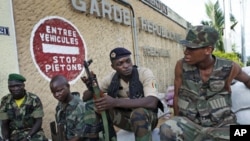Human Rights Watch is condemning attacks on civilians in Ivory Coast by former rebels loyal to President Alassane Ouattara, who the group says were not disarmed following last year's post-election conflict. That perceived impunity for these forces threatens long-term stability in the troubled West African country.
International watchdog Human Rights Watch says at least 22 people have been murdered near the central Ivorian city of Bouake since December. Bouake is Ivory Coast's second largest city and the former capital of the New Forces, an armed rebel group that retained de-facto control over the northern half of the country following a 2002-2003 civil war.
These fighters brought Ouattara to power last year during a violent post-electoral conflict that killed approximately 3,000 people.
Many have since been incorporated into the new national army, called the Republican Forces of Ivory Coast, though that term is also still used to refer to all pro-Ouattara combatants.
HRW Ivory Coast researcher Matt Wells said many of those volunteer fighters have yet to be disarmed.
"The Ouattara government has said it is still deciding who will be involved in the new army. The U.N. has told us that they don't yet know who they are supposed to disarm," said Wells. "The result is that tens of thousands of youth who were armed during the conflict continue to carry Kalashnikovs [AK-47 rifles], and now they are using these guns really to wreak havoc on the population through violent criminality and armed robbery."
Human Rights Watch says victims told them that groups of attackers armed with assault rifles are blocking roads with wood or cars, and then systematically robbing, and sometimes killing, people in passing vehicles. HRW says it spoke to several women who described being strip-searched and then raped.
HRW says attacks of this nature were common in the far west of the country, which was dominated by militia loyal to former president Laurent Gbagbo.
Wells said those militia already are being disarmed following last year's conflict. It is now the central part of the country, he said, that is seeing unprecedented levels of violent crime despite recent government efforts to discipline soldiers.
Wells said the violence is "closely linked" to impunity so far enjoyed by pro-Ouattara forces for war crimes and abuses documented during last year's conflict.
"There is a sentiment that President Ouattara is somewhat constrained at the moment in going after the Republican Forces. These forces did bring him to power, and so there is something of a debt. There is a strong need now, particularly given this rise in criminality, to realize that in fact these forces that were once helpful have become a real hindrance to Cote d'Ivoire moving forward," said Wells.
Former president Gbagbo refused to step down in November 2010 after losing a run-off election to Ouattara. During the six-month crisis that followed, human rights authorities say forces loyal to both sides committed atrocities.
Military and militia loyal to Gbagbo have been accused of killing pro-Ouattara political leaders, gang-raping women believed to support Ouattara, attacking pro-Ouattara neighborhoods of Abidjan with rockets and heavy artillery, and stopping hundreds of perceived Ouattara supporters at checkpoints to torture and execute them.
Pro-Ouattara fighters are accused of killing civilians from pro-Gbagbo ethnic groups, raping women, burning villages and taking part in the massacre of hundreds of residents of the western town of Duekoue, during the offensive launched in late March 2011 that ultimately ousted president Gbagbo.
Ouattara repeatedly has pledged to hold perpetrators of abuses on both sides accountable.
Human Rights Watch says so far, however, all of the 120 people or more charged by military and civilian prosecutors with post-election crimes are from the Gbagbo camp.
Suliman Baldo of the New York-based International Center for Transitional Justice was one of three experts who investigated post-election abuses in Ivory Coast on behalf of the U.N. Human Rights Council last June.
"We have witnessed since the end of the conflict, a remarkable comeback of Ivory Coast at the economic level. But in reality at the level of rule of law, the way justice, whether criminal justice or reconciliation, is being approached so far is giving the perception to the population that this is one-sided justice, victor's justice of a sort. And this reinforces distrust and the disengagement of communities that feel themselves now as the losers from ongoing reconciliation and justice processes," he said.
Baldo said unresolved tensions from the 2002-2003 civil war involving land ownership, nationality and ethnicity were drivers of last year's conflict and continue to fester.
Those tensions, he said, combined with pro-Gbagbo leadership and militia who are now living just across the border to Liberia, could spell trouble.
Former president Gbagbo is currently awaiting trial at the International Criminal Court for crimes against humanity.
The ICC has announced that it is extending its investigation into abuses committed by all sides to as far back as 2002, though human rights advocates say it remains to be see what, if any, charges will be levied following those investigations.
News
Rights Group Condemns Violent Crime, Impunity in Ivory Coast
- By Anne Look




